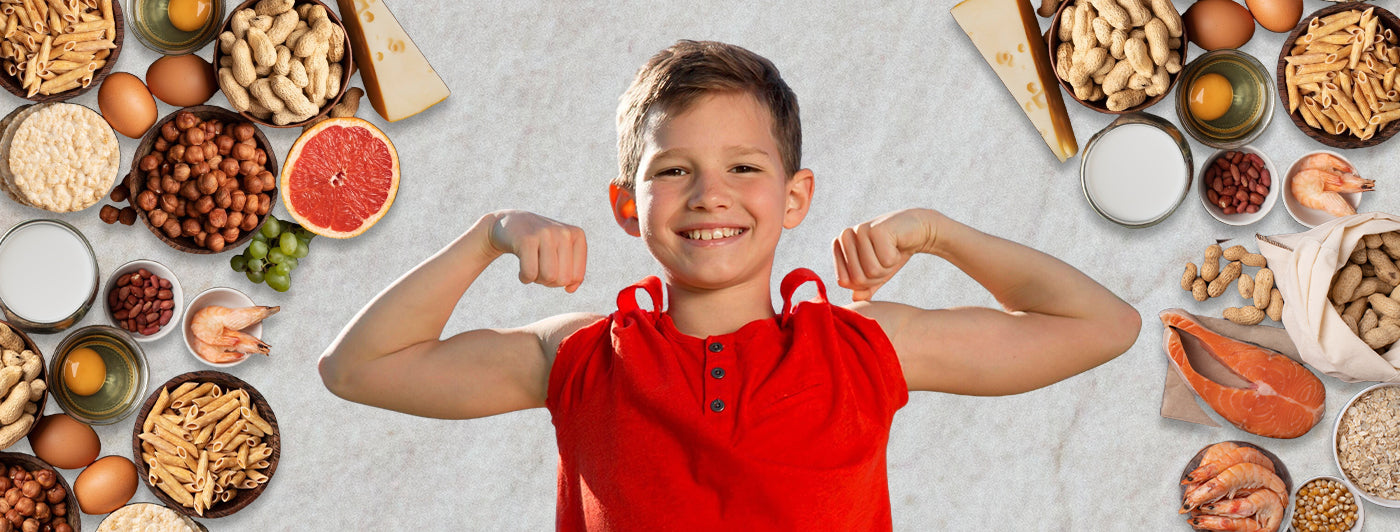Top 10 Sources of Protein for Child Growth
Ensuring that children receive adequate protein for child growth is essential for their development, energy levels, and overall health.Protein supports muscle formation, repairs tissues, and plays a key role in hormone production. Given its significance, parents must be mindful of incorporating sufficient protein into their child’s diet. In this article, we’ll explore the top 10 sources of protein that can help promote healthy development in children.
The Role of Protein in Supporting Child Growth

Protein plays a crucial role in a child's growth, helping to build and repair tissues, produce enzymes and hormones, and maintain overall health. Adequate protein for child growth is necessary to support these functions. For children who are physically active or undergoing growth spurts, their protein requirements for children can be higher than average.
1. Eggs
Eggs are one of the most versatile and complete sources of protein. They contain all the essential amino acids needed for muscle development and tissue repair. A single egg provides approximately 6 grams of protein, along with important vitamins such as Vitamin B12 and choline, which are vital for brain development.
For a balanced breakfast, consider preparing scrambled eggs or an omelet with added vegetables. This will not only provide a good amount of protein but also enhance the meal's nutrient content.
2. Dairy Products
Dairy products, such as milk, yogurt, and cheese, are excellent sources of high-quality protein. They are easily digestible and beneficial for bone health, thanks to their calcium content. Including a glass of milk or a serving of yogurt in your child's daily diet can help meet their nutritional needs.
Greek yogurt is a particularly great choice as it contains more protein compared to regular yogurt. Adding some fresh fruit can make it a delicious and protein-rich food for kids.
3. Chicken
Lean meats like chicken are rich in protein and are commonly used in children's diets to support development.A 3-ounce serving of chicken breast can provide around 20-25 grams of protein, making it an effective source for fulfilling daily protein needs.
Parents can include grilled or baked chicken in meals, or add shredded chicken to soups and salads. It’s a great option for building lean muscle and keeping children active.
4. Fish
Fish, especially fatty fish like salmon and tuna, offer high-quality protein along with omega-3 fatty acids, which support brain development and cardiovascular health.These nutrients are essential for children, especially during growth spurts when the body's protein needs are higher.
Fish can be served as grilled filets, added to sandwiches, or even incorporated into pasta dishes. For picky eaters, fish sticks made from whole fish filets can be an appealing alternative.
5. Legumes and Beans
For plant-based options, legumes and beans such as lentils, chickpeas, and black beans are excellent choices. They provide a substantial amount of protein, fiber, and essential vitamins and minerals that contribute to overall health.
Including a variety of legumes in meals, like making lentil soup or adding chickpeas to salads, can diversify a child's diet. It's a great way to introduce plant-based proteins that cater to vegetarian or vegan preferences. In some cases, adding vegan protein powder to soups or smoothies featuring legumes can help increase protein content, especially when extra protein is needed to meet dietary requirements.
6. Tofu
Tofu is a versatile plant-based protein source made from soybeans. It's suitable for children who follow vegetarian or vegan diets. Tofu is rich in high-quality protein and contains all the essential amino acids, making it an effective option. A half-cup of tofu provides about 10 grams of protein.
It can be added to stir-fries, soups, or even blended into smoothies for a protein boost. When choosing tofu, opt for organic varieties to ensure the highest quality.
7. Nuts and Nut Butters
Nuts like almonds, peanuts, and cashews, as well as their butters, are not only delicious but also provide a good amount of protein. They are also rich in healthy fats, vitamins, and minerals, which are essential for a child's development.
Including a handful of nuts as a snack or spreading almond or peanut butter on whole-grain bread can be a great way to incorporate more protein into the diet.
8. Quinoa
Quinoa is a gluten-free grain that serves as a complete protein source, providing all the essential amino acids. It is perfect for children who may have gluten sensitivities or who follow a vegetarian diet. Quinoa can be used as a base for salads, mixed with vegetables, or added to soups for a nutrient-dense meal.
Its high protein content makes quinoa a fantastic choice for parents seeking to enhance their child's diet naturally.
9. Edamame
Edamame, or young soybeans, are an excellent plant-based source of protein, providing about 17 grams of protein per cup. It’s a versatile protein-rich food that can be enjoyed as a snack straight from the pod, added to stir-fries, or blended into dips. Edamame also contains essential vitamins and minerals like iron, calcium, and fiber, which are beneficial for a child's growth and overall health. The soft texture makes it suitable for kids of various ages, and it’s especially popular for its fun "pop" when eaten directly from the pod.
Including edamame in a child's diet can be a flavorful way to boost protein intake while also providing additional nutrients necessary for healthy development.
10. Seeds
Seeds like chia, hemp, and pumpkin seeds are not only packed with protein but also contain other vital nutrients like omega-3 fatty acids, magnesium, and zinc making them excellent protein rich foods for kids. Adding a tablespoon of seeds to your child’s yogurt, smoothies, or salads can significantly boost their daily protein intake.
Chia seeds, in particular, can absorb liquid and form a gel-like consistency, making them perfect for making puddings or adding to baked goods for a protein boost.
Conclusion
Protein plays a crucial role in supporting children's growth, development, and overall well-being. Incorporating a variety of protein-rich foods, along with considering options like Protein Powder for Kids, can help meet their nutritional needs effectively. Ensuring adequate protein intake is essential for promoting physical and cognitive development, building a strong immune system, and maintaining consistent energy levels. By making protein a key part of your child's diet, you're laying the foundation for their long-term health and happiness, fostering both immediate and future benefits.











